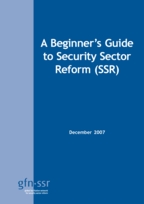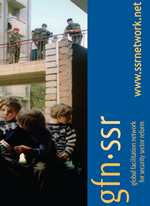Sub-Regional Case Studies
Anglophone West Africa
Liberia
Liberia’s record for political and economic development in the second half of the twentieth century has been amongst the worst in the world. From 1989, and after years of dictatorship, Liberia experienced a 14-year civil war. The conflict was marked by human rights abuses on all sides and destroyed the Liberian state, economy and society, while spreading to neighbouring countries – in particular Sierra Leone and Guinea. ECOWAS-supported peace talks helped bring an end to the conflict in August 2003. Charles Taylor, leader of the rebel group that fought in 1989 and later president in 1997, was extradited to The Hague in 2006 to face war crimes charges. Nonetheless, his legacy continues to have a major impact on current peacebuilding efforts.
After an initial transition period, Ellen Johnson-Sirleaf was elected as president in 2006, becoming Africa’s first female elected head of state. Since then, reconstruction has taken place and security sector transformation has been a priority. Liberia’s post-conflict environment, however, poses one of the most challenging environments for SSR to date as a wholesale rebuilding of the security sectors is required. The US and the UN (through UNMIL) have taken a leading role, but SSR has so far focused on technical reforms, such as the recruitment and training of the armed forces and police, rather than on ensuring democratic governance and a holistic system-wide approach. This is partly a result of the extensive, and at times controversial, use of private contractors. Other SSR-related concerns include: a lack of national ownership of the process; an incomplete disarmament, demobilisation and reintegration (DDR) process; problems with resources and achievements for the Truth and Reconciliation Commission; endemic corruption linked to an abundance of valuable natural resources; and a reliance on donor-support for Liberia’s continued security and development.
- SSR: General
- Police Reform
- Justice Reform
- Private Military Companies/Private Security Companies
- Related Texts
SSR: General
Jaye, T., 2008, Liberia’s Security Sector Legislation, DCAF, Geneva
How can Liberians, following an extended period of civil war, regain effective oversight of their elected representatives and avoid further violent conflict? This Geneva Centre for the Democratic Control of Armed Forces (DCAF) report argues that such an outcome can only derive from the rule of law. It is essential that legislators and other stakeholders are aware of the legal framework for security provision and governance in Liberia. This compendium provides a comprehensive list of the existing security legislation.
Malan, M, 2008, Security Sector Reform in Liberia: Mixed Results from Humble Beginnings, Strategic Studies Institute, US Army War College, Pennsylvania
How much progress has been made with security sector reform (SSR) in Liberia? This Strategic Studies Institute paper examines SSR in Liberia and argues that while the United Nations (UN) and the United States (US) have made a start with police and military reform, they have not done nearly enough. The UN, US, as well as other significant donor partners, need to stay the course with Liberia. SSR is a long-term process, not an ephemeral happening.
Crane, K. et al., 2007, Making Liberia Safe – Transformation of the National Security Sector, Monograph, RAND, Santa Monica,
Liberia’s national security sector operates under old structures that are unworkable, wasteful and do not engender the support of the people. This paper recommends the organisation of a new sector architecture of both force structure and security institutions. Liberia must create a new security structure capable of meeting the country’s internal and external challenges.
DCAF, 2007, Interactive Needs Assessment for Security Sector Oversight for Liberian Legislature, 28-30 March 2007 at Kofi Annan International Peacekeeping Training Centre, Accra
How can the Liberian parliament gain greater oversight of its security sector? This King’s College London report highlights the outcomes of a workshop held in Accra, Ghana to assess the authority, ability, and attitude of the Liberian legislature to conduct security sector oversight. It is essential that the necessary support is provided to the Liberian legislature so that as the constitutional custodian of the security sector it efficiently undertakes its vital role.
Jaye, T., 2006, An Assessment Report on Security Sector Reform in Liberia, Governance Reform Commission of Liberia, Monrovia
What are the critical issues for security sector reform (SSR) in Liberia? The Governance Reform Commission (GRC) set up by the president of Liberia to provide professional and intellectual leadership of Liberia’s security sector reform (SSR) has assessed the country’s security sector and reviewed existing legislation. It concludes that the SSR process in Liberia is taking place within very volatile, uncertain and fragile internal and external security environments. The precarious position makes the task of SSR challenging, necessary and relevant.
Police Reform
Baker, B., 2007, Post-War Policing by Communities in Sierra Leone, Liberia, Rwanda, Democracy and Security, vol. 3, no. 2, pp. 215-36
What role does community-based policing have in post-conflict states? In his article, Bruce Baker demonstrates that community-based (non-state) policing in Sierra Leone, Liberia and Rwanda has survived conflict, but that its variable form and function is in part the product of conflict. In a context of limited state police resources, community-based policing is not to be dismissed lightly as a significant security provider for post-war democracies.
Justice Reform
International Crisis Group, 2006, Liberia: Resurrecting the Justice System, Africa Report no. 107, International Crisis Group, Dakar/Brussels
Reform of the Liberian justice system should be made a top priority for donors. However, this report, published by the International Crisis Group (ICG), illustrates that donor efforts to promote long-term justice reform can only succeed if the Liberian government puts justice reform prominently on the agenda and if the legal and judicial fraternities take the lead effort in the reform process. Community-based approaches, with a sustained focus on gender issues and on the urban/rural divide, are also needed to empower individuals and to help people navigate the statutory and customary legal systems in Liberia.
Private Military Companies/Private Security Companies
Ebo, A., 2007, Liberia Case Study: Outsourcing SSR to Foreign Companies, in No Ownership, No Commitment: A Guide to Local Ownership of Security Sector Reform, ed. L. Nathan, GFN-SSR, Birmingham UK, pp. 78-86
A major problem in security sector reform (SSR) has been a lack of local input to and ownership of the emerging reform agenda. Consequently, many donor governments and organisations have made commitments to the principle of local ownership. Yet this has become more a rhetorical device than a guide to donor practice. This case study considers the critical issue of local ownership in reforming the security sector in Liberia. It describes the main developments over the past three years, identifies lessons and makes recommendations to donors.
Related Texts
Zounmenou, D., 2008, Managing Post-War Liberia: An Update, ISS Situation Report, Institute for Security Studies, Pretoria
What are the key challenges facing the post-conflict reconstruction process in Liberia? This situation report, published by the Institute for Security Studies, demonstrates the progress towards peace and stability achieved since the Comprehensive Peace Agreement (CPA) of 2003. By articulating an appropriate response to the country’s basic socio-economic needs, Liberian authorities are in a position to promote peaceful, sustainable development. Finally, four possible future scenarios for Liberia are projected and described, ranging from a consolidation of the peace process to renewed violence.
KAIPTC/ZIF, 2007, Post-Conflict Peacebuilding in Liberia, Report of the Third Annual KAIPTC / ZIF Seminar Accra, Ghana November 1 – 3, 2007, Berlin
How successful has post-conflict peacebuilding in Liberia been? This Centre for International Peace Operations (ZIF) report outlines the findings of an international seminar held in Accra, Ghana to assess peacebuilding since the establishment of the United Nations Mission in Liberia (UNMIL) in September 2003. There has been significant progress in stabilising the country but there remain many loose ends. Setbacks could yet destabilise the country and even lead to renewed conflict.
More documents covering security sector reform in Liberia can be found online in the GFN-SSR Document Library.









